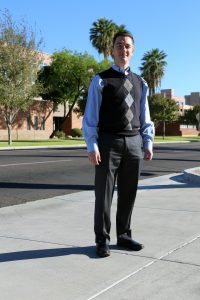From the Arizona Capitol Times on November 21:

Most Arizonans probably don’t know that their state is home to the chairman of a national political party.
Since 2014, Nicholas Sarwark has chaired the Libertarian National Committee. An Arizona native, Sarwark returned home to Arizona several years ago after living in Colorado and Maryland, and planned to follow in his father’s footsteps by preparing to take over the family auto dealership.
Sarwark, 37, also followed in his father’s footsteps in another way, taking up his libertarian ideals as a young man. Since then, he’s run the Libertarian Party in Maryland and helped run it in Colorado. Now, he chairs the Libertarian Party at the national level. And with the presidential election and Libertarian nominee Gary Johnson out of the spotlight, he becomes his party’s national face.

Nicholas Sarwark
How does a 37-year-old become the national chairman of a political party?
I’ve been involved in the Libertarian Party my entire adult life, since probably ’98, ’99, when I got out of college. And I had been exposed to it going back to when I was like 12 years old going to Maricopa County Libertarian meetings with my dad. So I’ve never been anything other than a Libertarian. It was actually a longer trip through the ranks than it may seem from my age. I was chairman of the Libertarian Party of Maryland back when I lived there, and then vice chairman of the Libertarian Party of Colorado, and served on the national judicial committee, which is part of our internal appellate body, if you will, and some bylaws committees and things like that. So I’ve been around it for a long time. And mostly I just saw the party not going in the direction I wanted it to go back in 2014. And that coincided with some career choices that I could make that would make it a possibility to have that kind of profile. And I ran a campaign.
What was the direction of the party that you didn’t like?
We weren’t moving as fast as we should with the rise of libertarianism in the broader American populace. So we were getting all sorts of popularity for things like marijuana legalization and marriage equality and things that the Libertarian Party had had as part of the platform since the early ’70s. But the Libertarian Party’s membership growth and voter registration growth were anemic in comparison or almost stagnant. And I felt like we needed to go out and put a stronger face on libertarianism, and one that appealed more to a vast swath of Americans that are disaffected from politics generally and a new, younger generation that have not made their political decision yet. The other thing is I had training as an attorney. I was a deputy public defender in Colorado for five years. Public speaking is one of those things that I’m comfortable with, and we did not previously have a chairman who did a lot of media interviews, who went out and spoke on TV or gave speeches and things like that. So we needed someone to be the higher-profile face of the party during that time when we’re not in an election cycle. Yeah, for the last five months, everyone wants to talk to Gary Johnson and not me. And that’s fine. But for the next 19 months, somebody has to be the one who answers the call for interviews or things like that and is able to present an articulate and clear vision to the American people.
Some people are late converts to libertarianism, but for you it was in your family?
Yes, I’m one of the second-generation Libertarians, of which there are many more, and hopefully my three kids will also be. So they’ll be third generation. And it does give me a different perspective.
You’re a native Arizonan who lived out of state for a while. What brought you back to Arizona?
My family owns Consolidated Auto Sales at 16th Street and Van Buren, which is the oldest independent car dealership in Phoenix. It’s been there since 1942, when my grandfather founded it. I had done a lot of things. I hadn’t wanted to just go into the family business because I could. So I was a computer consultant for a long time in D.C. And then I went to law school. I was a deputy public defender in Colorado for five years. And my father someday wants to actually retire rather than be there two weeks before he passes away, like my grandfather was. And it came time to discuss whether or not we wanted to let the business shut down or if I wanted to come and be part of it. I had done other things, so I knew what I was missing. And I felt like it was time to be that third generation and keep that business going. It’s been kind of a pillar of the community. We employ, I think it’s 11 or 12 people. They have good jobs that can feed their families. We’ve helped families get cars for decades.
Gary Johnson got a little under 4 percent of the vote in Arizona, but increased his 2012 showing pretty dramatically. Is that more a result of Libertarian momentum or of the unpopularity of Clinton and Trump?
It’s a little bit of both. The unpopularity of the old party candidates was huge this year. But if you look at trend lines, especially nationally, you have a president-elect who received less votes than either Mitt Romney or John McCain, both of whom lost badly. You have a runner-up who got 6 million less votes than President Obama got in 2012 nationally, almost 7 million less votes. And then you have the Libertarian candidate tripling our vote total and getting 4 million votes. It’s all about long-term trend lines.
Obviously you were all in for Johnson, but did you have a preference between Clinton and Trump?
Not really. … I had plans and still have plans for how to deal with either likely election outcome, as far as what issues the Libertarian Party will be stressing going forward. With this one, we have to wait and see what he actually does, because if there’s one constant with Donald Trump, it’s that you don’t count on what he says. You wait and see what he actually delivers.

